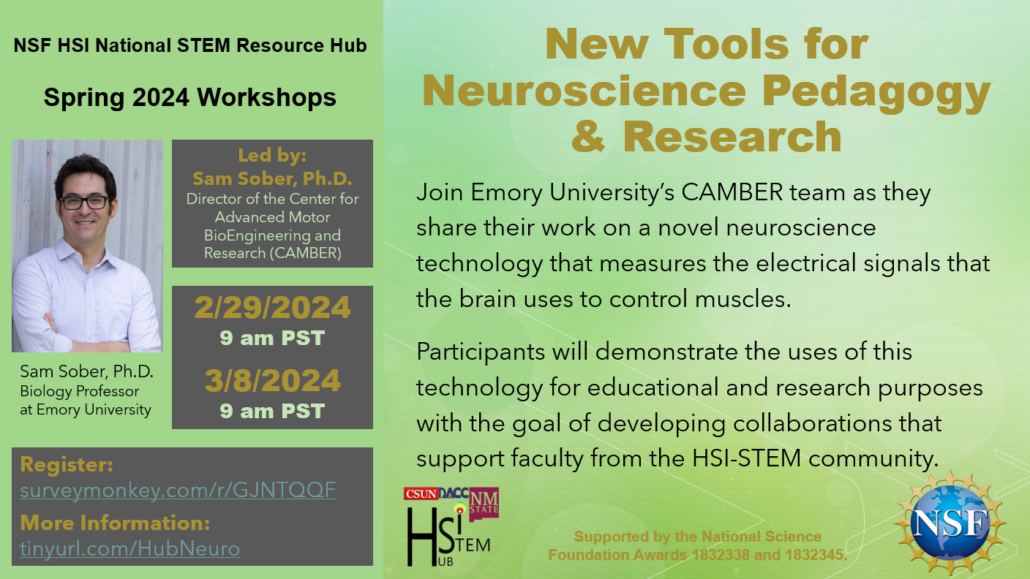New Tools for Neuroscience Pedagogy and Research
Workshop Summary
We are a group of motor systems neuroscientists whose research interests are focused on understanding how the nervous system controls complex movements. To that end, we have developed an innovative new technology (“Myomatrix arrays”) for precisely measuring the signals that the brain uses to control muscles. Myomatrix arrays can be used for both original research projects and to teach students about basic nervous system function. Our NIH-funded center (CAMBER) supports the FREE distribution of the Myomatrix arrays to interested faculty. In this workshop, we will describe the uses of these arrays for educational and research purposes and connect interested faculty to CAMBER, with the goal of developing collaborations that support faculty from the HSI-STEM community.
Learn about the whole spring series here.
Goals of the Workshop
The goals of this workshop are:
- To convey fundamental principles of how the brain controls the body to perform simple and complex behaviors.
- To develop collaborations with interested faculty to generate curricular materials using the Myomatrix arrays.
- To develop collaborations with interested faculty to incorporate Myomatrix arrays into their ongoing research projects.
Eligibility
Enrollment is free and is limited to 30 participants per workshop. It is hoped that the small workshop size will facilitate networking and promote collaboration across institutions by individuals who share common interests in research and education.
Participation priority is for current HSI faculty and staff who teach undergraduate STEM courses. Non-HSI faculty staff who teach undergraduate STEM courses are eligible to apply if they: 1) currently collaborate as PIs/co-PIs on a funded or pending NSF EHR/DUE grant that includes HSI faculty/staff as PI/co-PIs or 2) would like to network to find HSI partners for future collaborative projects in education or research. Admission priority is for faculty within the first 10 years of their first academic tenure-track appointment. Applicants should be aware that the selection decision is final and summary review are not provided.
Apply
Submit your registration at this link.
Learning Objectives
Upon completion of this workshop, attendees will be able to:
- Describe the Myomatrix array and its advantages compared to other techniques that are used to record electrical signals from muscle.
- Understand how the nervous system uses electrical signals to activate muscle to produce purposeful behaviors.
- Describe potential applications of the Myomatrix arrays in teaching neurophysiology concept.
Materials to review in advance:
Workshop Sponsors:
Center for Advanced Motor BioEngineering and Research (CAMBER). Award number: U24NS126936
Workshop Details
Workshop Speakers
 Sam Sober is an associate professor of Biology at Emory University and the Director of the Center for Advanced Motor BioEngineering and Research (CAMBER). Dr. Sober earned a B.A. in Neuroscience and Behavior from Wesleyan University and Ph.D. from UC San Francisco in the lab of Phillip Sabes. His research interests focus on understanding how the nervous system successfully produces appropriate patterns of muscle activation, resulting in the desired behavioral output. His research on singing behavior in finches and stepping behavior in rodents investigates the relationship between these very different levels of description – neural activity, muscular activation, and task performance – by using a range of techniques to describe how neural circuits drive the complex behavior and are modified by sensorimotor experience.
Sam Sober is an associate professor of Biology at Emory University and the Director of the Center for Advanced Motor BioEngineering and Research (CAMBER). Dr. Sober earned a B.A. in Neuroscience and Behavior from Wesleyan University and Ph.D. from UC San Francisco in the lab of Phillip Sabes. His research interests focus on understanding how the nervous system successfully produces appropriate patterns of muscle activation, resulting in the desired behavioral output. His research on singing behavior in finches and stepping behavior in rodents investigates the relationship between these very different levels of description – neural activity, muscular activation, and task performance – by using a range of techniques to describe how neural circuits drive the complex behavior and are modified by sensorimotor experience.

Bob Wyttenbach is a teaching professor in the Emory Neuroscience and Behavioral Biology (NBB) program. He completed his PhD in Neurobiology and Behavior at Cornell University in 1995 and then stayed on to continue his research in insect hearing and to develop teaching materials with support from the NSF. He has written or co-authored resources such as Crawdad (neurophysiology lab manual), PsyCog (experiments in perception and cognition), and GameBug (evolutionary game theory tutorial). At Emory, Cornell, and elsewhere, he gives faculty neurophysiology teaching workshops with others on the Cornell team.

Kristen Frenzel is the Associate Director for Education and Outreach for CAMBER. Prior to this position, she was a teaching professor in the Emory Neuroscience and Behavioral Biology (NBB) program and worked with faculty on a NSF-funded grant to create pedagogical tools for undergraduate neuroscience curricula. She earned a B.S. in Applied Biology from Georgia Institute of Technology and a Ph.D. from Emory University in Biochemistry, Cell and Molecular Biology.
.
Workshop Sponsors and External Links




